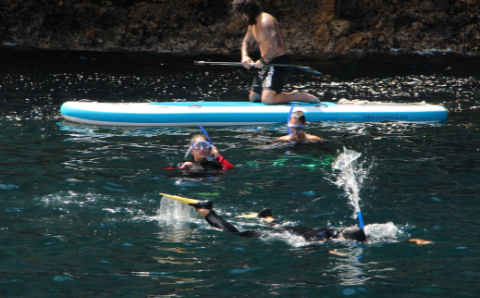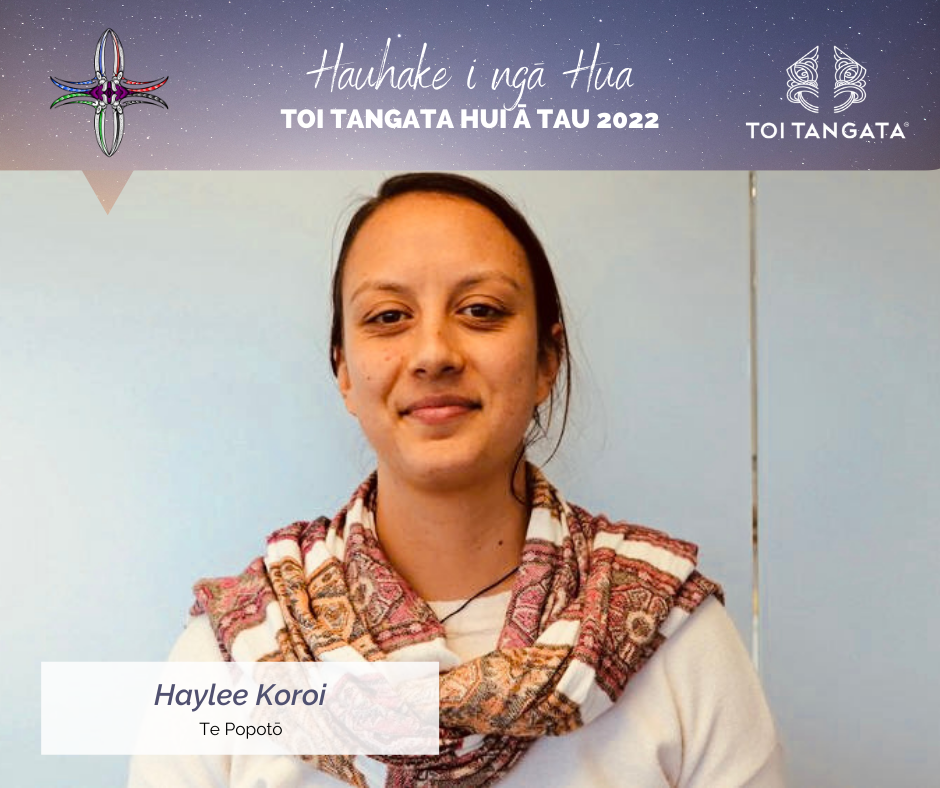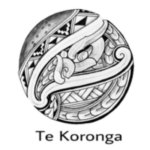04 May Te Koronga Reflects on the Toi Tangata Hui ā Tau 2022
Te Koronga is a Māori research excellence kaupapa based at the University of Otago. Dr Chanel Phillips and the Te Koronga team joined us at the Toi Tangata Hui ā Tau 2022 in March and took some time to reflect on the kaupapa, sharing their thoughts with us below. Enjoy the insights they so willingly share.
Tēnei au te koronga
He hiringa nōu e Ruatau
ki ēnei tauira, ki ēnei pia
Tō ake nei au i te tatau o taku whare
Ko Te Rangikaupapa, tatau o Tāwhirirangi
I te pūmotomoto o te kauwhanga o te Toi o ngā Rangi
E Pawa
Tutakina i taurunui, i tauruatamai o wharekura
Kapikapi tō aro
Kapi te ngātata, te ngātoro, te piere, te tatau o tēnei whare e tū iho nei
Nā tō aro, nā tō pia
E Rehua, mā Ruatau ē
Tēnā koutou, ngā whānau whānui o Toi Tangata
Ko wai mātou?
We are Te Koronga, a Māori research excellence kaupapa based at the University of Otago comprised of two parts: Te Koronga: Indigenous Science Research Theme and Te Koronga: Graduate Research Excellence Programme. The vision of Te Koronga is Mauri Ora. Mauri Ora is flourishing wellness. Our kaupapa is Māori research excellence based on the aspirations of Māori communities underpinned by a kaupapa Māori ethos. We have had a long standing relationship with Toi Tangata and share in our collective passions and kaupapa for hauora, mauri ora and realising Māori potential.
Looking at Toi Tangata Hui ā Tau over the years
My first introduction to Toi Tangata began as a young Masters student presenting at the Toi Tangata Hui ā Tau at Ōrākei Marae in 2014 as part of their student presentations. As a young tauira I remember Toi Tangata being such a welcoming space for students as we were encouraged to share our research and voice. I attended the hui alongside my two supervisors and two fellow students, one of whom provides her experience later in this article.
Five years later I was invited to present as a keynote speaker at the Toi Tangata Hui ā Tau in Ngunguru, a place I whakapapa to and have many special childhood memories of. This Hui ā Tau was particularly special to me, as I was supported by our Poutokomanawa of Te Koronga and one of my closest friends and fellow Te Koronga student, who also provides her kōrero below. As a recently completed PhD student it was daunting to present my first keynote talk, but knowing I had the support with me, and this shared history and whakapapa with Toi Tangata set me at ease.





And finally, that brings us to 2022, three years later being invited to speak on the wai panel alongside Papa Rereata Makiha. While this Toi Tangata Hui ā Tau was presented online, I was again supported by my same supervisors and wider Te Koronga whānau who were all tuning in from around the motu. While I share a small piece of my whakapapa with Toi Tangata, it is a shared whakapapa we in Te Koronga have with the Toi Tangata whānau, one that spans many years before my beginning in 2014, and one I know will continue for many years to come. As I said at the Toi Tangata Hui ā Tau 2022, whakapapa is a beautiful thing, and like wai, connects us all.
We share with you all some of our experiences and lessons from the Toi Tangata Hui ā Tau 2022, and how important these connections of past, present and future are, as they continue to support many of our tauira who similarly have a love for physical activity, nutrition and human potential.
Nā Dr Chanel Phillips (co-director Te Koronga)
Toi Tangata Hui ā Tau 2022
The Toi Tangata Hui ā Tau 2022 was absolute magic. As a participant, it was a privileged space to be in. The calibre of speakers was beyond incredible, many of them are real tohunga in their fields. The kōrero enriched my soul and was a demonstration of our collective capacity to make transformative change. The importance of our connection to taiao was a big take away for me. That our engagement with taiao, whether that be in looking after our repo or in the māra – is really us expressing ourselves as Māori. For example, Matua Rereata shared that when we look after our wai, we are in fact looking after ourselves and when Rangimarie said we as Māori can connect directly to Papatūānuku by practising māra kai – I felt my tūpuna sigh in appreciation. Nei ra ngā mihi ka rere kia koutou, Toi Tangata, reka rawa atu te kōrero hei rongoā, ā-wairua, ā-ngākau, ā-hinengaro hoki.
As it had been a couple years since attending a conference, this was the ideal kaupapa to jump back into this world again. I was able to attend day one and half of day three. The āhua of the conference was my favourite aspect, from the mihi to the kaikōrero and workshops and also going through the kōrero on Slack as well. It was as close as you could get to be kanohi ki te kanohi. The Toi Tangata team did a great job in providing space because the biggest part of any conference is the connections you make, and they provided a space where we were still able to do that virtually.
The speakers were incredible, individually their kōrero was super engaging and inspiring to listen to. Then as a panel, the way in which they were able to answer pātai and engage with the audience and wānanga with us was even more amazing. This felt very inclusive and not like you were just a face on the screen. Kawiti was an awesome MC as well, he did an incredible job alongside the kaikōrero. It was very obvious that he paid attention and had extensive mātauranga in the three key kaupapa (wai, kai, kori) as well.
What I really enjoyed about Toi Tangata Hui ā Tau 2022 was it gave me a new angle to look at some of the areas of how I have been approaching my own research. This was especially helpful as I am coming to the stage of writing up the end of my Masters research. In particular, I really enjoyed Dr Wayne Ngata’s kōrero about engaging in mātauranga through the taiao, and the discussion around Ihirangi Heke’s Atua Matua framework. I noted down something specific that stuck with me:
“Obsession with centring size, exercise and nutrition is a pākeha conception of health which is preventing us from moving towards a space of mauri ora.”
-Dr Wayne Ngata
I felt I resonated with this as exercise and physical activity as the main focus is always in the back of my mind. Through being in other spaces (like Te Koronga) I have learned from and understood other perspectives, but I think it was so beneficial to listen to a kōrero that really highlighted this.
This led to a discussion about engaging in the taiao and learning the whakapapa and mātauranga, the importance of uncovering this knowledge – and the exercise and physical activity associated with this – are incidental outcomes rather than the focus. Dr Ngata described this as whai mātauranga, where the path or journey of knowledge is key. He used the example of walking up a maunga, the hīkoi being the incidental outcome but what is uncovered along the way was important. I felt I was then able to relate this to my own research which has been super valuable.
On day two, the kōrero about food systems, māra kai, and tohu in the environment was amazing. Haylee Koroi related this to the timing of the environment and how this influences growing and harvesting food. However, she also talked about this timing in a daily life sense, about society having created a false sense of urgency.
“We don’t have to grind ourselves and burn out. This idea comes from a capitalist perspective, it goes against what the taiao says.”
– Haylee Koroi
She gave the example of hanging washing outside – how three out of seven days in a week it is likely to be raining and so therefore we cannot hang our washing outside. She talked about this being a sign to just leave it, to know when not to rush or do things, whereas in most cases now, we are forcing what the taiao is telling us not to do. Ultimately what I got out if this kōrero was that time is a central part of how we make sense of things, I believe she was talking about this in the sense of food systems and maara kai but she also related it to the way we live our lives, in a busy rush which sometimes we miss or ignore other aspects that are important and key to our understanding and learning. I enjoyed the conference being online as it meant I could carry on with my own work in the background, sometimes able to directly put some ideas of what I was hearing straight into my thesis! I thought the way it was set up was super easy to use and couldn’t be critiqued!
I feel super privileged to have had multiple opportunities to fill my kete with new knowledge, awareness and understanding across the three day Toi Tangata Hui ā Tau 2022. Day three was a particularly triggering day as the panel of kai kōrero with Nani Kuini Moehau Reedy, Dr Hauiti Hakopa and Wiremu Sarich shared their wisdoms with us. I had several ‘ihi, wehi, wana’ moments of enlightenment throughout this panel discussion. When I tuned out of my head and into my mānawa, I experienced my own magical moment where the reo started to come to me naturally. It was a pretty surreal experience for me, where I felt as though I was transported into a different space, a different realm, a spiritual realm. I found myself responding to messages in te reo Māori and realised later how much I was comprehending and how much I can actually speak. I want to thank Toi Tangata for unapologetically letting the panellists kōrero in their native tongue, because it was special to see, hear, and feel. And it had a profound impact on me. In fact, it felt much like how I imagine an ancient Whare Wānanga to be, so I feel very privileged to have had an opportunity to share in this moment with everyone who tuned in – tino waimarie!
I’d like to just send a huge mihi to Toi Tangata for the breadth and the depth of kaikōrero, for balanced perspectives across, age, gender, locality and language fluency. Also I feel congratulations is in order for continuing the Hui ā Tau kaupapa amidst a global pandemic and for finding ways to enable rich kōrero and mātauranga Māori to flow so seamlessly in an online environment. Mahi rangatira!
Collective thoughts
I te wiki kua pahure ake nei, i haere au ki te hui ā tau a Toi Tangata, ko te kaupapa o te hui, ‘Hauhake i ngā hua’, nā reira he maha ngā hua kua puta mai. Mai i te taenga mai o te kete hui, taenoa atu ki te mutunga o te hui.
Rā tuatahi, kaupapa wai
From the opening karakia, the scene for the kaupapa was set, ahakoa e noho ā-ipurangi tātou kei ā tātou ake whare, the tone of the hui was awesome and engaging. I loved the hui ā tau soundtrack and it was a great way to set the scene for the kaupapa and make it feel as though we were all together. Kawiti was a great kairaranga kōrero, very engaging and facilitated the kōrero between Matua Rereata and Chanel really well. There were massive amounts of hua that emerged from the discussion of day one, highlighting the interconnectedness ki uta, ki tai and the importance of whakapapa in order to truly know and understand our landscapes.



Hui kete – Receiving the hui kete was awesome, filled with taputapu to be able to connect to the hui kaupapa and speakers and exciting rauemi to carry on with and embed into mahi and kaupapa after the hui was finished.
I attended the Tapuwaekura workshop which again was mīharo, great to be able to see how Tapuwaekura are applying all the learnings from Matua Ihi into practice around the motu with different kaiako and kura. It was really exciting to see the potential in this space and how this will ultimately contribute to our tamariki and rangatahi. The main kōrero that stuck with me was Me whakamāui tātou i a tātou, be like Māui, challenge, explore, be curious, back yourself.
Rā tuarua, kaupapa kai
‘Kai is a cultural expression.’
– Nā Rangimarie Mules i kī
This panel, which included Rangimarie Mules, Jared Hiakita and Haylee Koroi, facilitated by Kawiti, was awesome. Each of these kaikōrero hold a wealth of knowledge in this space and were able to articulate it beautifully. This panel was very impactful raising and discussing lots of important take around kai.



Te Kawa Robb then gave a great workshop around kai and some of his mahi in the marine space with kura in Te Whanganui ā Tara, Te Kawa’s personal experiences and upbringing, combined with his wealth of knowledge, made for a great workshop. Te Kawa was also able to make the workshop interactive, even though we were connecting through Zoom, by encouraging us to get outside and engage with our own taiao and bring those experiences and discoveries back to the rōpū. He allowed time for us as participants to connect with one another which enabled myself and others to discover the connections between us. He rawe tērā.
Rā tuatoru, kaupapa kori
‘Haramai tētahi āhua ‘Kei roto i ahau taku papa tākaro, tākorohia te kōrero’
– Nanny Kuini Moehau-Reedy.



Day three began with an amazing and insightful panel between Nanny Kuini, Wiremu Sarich and Dr Hauiti Hakopa. These three embody the kaupapa of kori which really shone through them in this panel. Being able to hear their kōrero, especially Nanny Kuini in this space, once again ahakoa ā-ipurangi, ka taea e tātou te kaha rongo i tana wairua. Nō tātou te whiwhi.
Nā ngā tauira o Te Koronga.
We are honoured to work closely with Te Koronga and thank them for their contribution to our kaupapa. Nō mātou te whiwhi.

Te Koronga
Te Koronga is a Māori research excellence kaupapa based at the University of Otago comprised of two parts: Te Koronga: Indigenous Science Research Theme and Te Koronga: Graduate Research Excellence Programme. The vision of Te Koronga is Mauri Ora. Mauri Ora is flourishing wellness. Their kaupapa is Māori research excellence based on the aspirations of Māori communities underpinned by a kaupapa Māori ethos.



